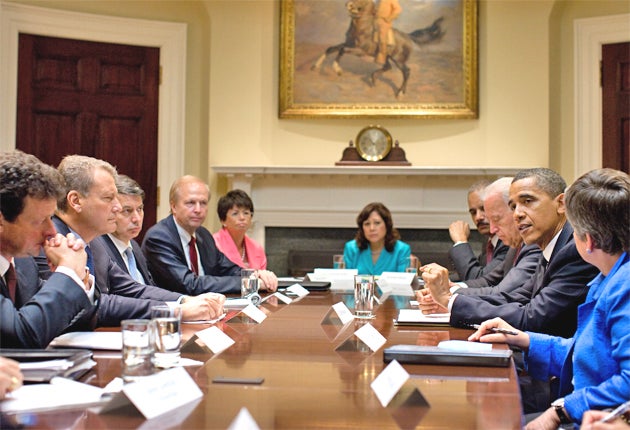Obama forces BP to set up $20bn account to pay Gulf oil spill claimants

Squeezed by a resolute White House, BP buckled last night to demands that it place $20 billion (£13.5bn) in an independently managed account to settle claims arising from the oil spill in the Gulf of Mexico and suspend dividend payments to its shareholders for the rest of this year.
The unusual and costly concessions were announced at the end of nearly four hours of sometimes intense negotiations at the White House between the principals of both sides, including BP chairman Carl-Henric Svanberg and, for a portion of the time at least, President Barack Obama.
The deal concluded weeks of bitter arm-wrestling between both sides. Obliging BP to put billions into a protected account was a key pledge of President Obama in his first Oval Office address to the nation on Tuesday night. The address, focused on the spill, received chilly reviews and anything less from yesterday's meeting could have spelled political disaster for the White House. Emerging from the White House portico, Mr Svanberg claimed that BP and the White House were now "fully aligned" on ending the spill, a characterisation that will very quickly be tested. "I apologise to the American people on behalf of all the employees of BP," the chairman added.
While the creation of the fund gave hope to Gulf Coast individuals and businesses hurt by the spill, the parallel agreement to suspend dividend payments for the rest of the year could squeeze millions in Britain and in the US who hold BP shares, often as part of retirement plans. In a statement, BP said it was suspending its 21 June disbursement and would not declare dividends for the next two quarters.
The claims fund will be managed independently by Ken Feinberg, a US lawyer chosen to oversee payments to families of 9/11 victims and the limiting of pay packets for executives of rescued Wall Street firms.
Beyond the fund, BP still has to pay for the clean-up effort and ongoing operations to capture leaking oil and eventually to plug the well entirely. It also announced it was forming a separate, $100m account to help pay lost income for oil workers laid off because of a six-month moratorium on deep-water drilling imposed by the US government because of the spill.
US officials made plain, moreover, that BP should consider the $20bn a down-payment rather than a capped amount. In other words, if, after a period of time, it emerges that that amount will not be enough to cover all the legitimate claims against it, the company will have to dig deeper for more.
In spite of the concessions, there is every sign that BP's chief executive, Tony Hayward, who took part in the White House meeting, will suffer a blow-torching when he goes before the House Energy and Commerce Committee today. "I expect him to be sliced and diced," said Congressman Bart Stupak, a sub-committee chairman.
Hampered by stilted English, Mr Svanberg invited a fresh public relations woe, noting that Mr Obama "cares about the small people", adding: "I hear comments sometimes that large oil companies are greedy companies who don't care, but that is not the case in BP, we care about the small people."
Aware of speculation about the ability of BP to withstand these financial pressures, Mr Obama said he was "absolutely confident BP will be able to meet its obligations", adding: "We will continue to hold BP and all other responsible parties accountable."
While the political dramas played out in Washington, in the dirtied Gulf BP said that a second system to siphon oil from the sea bed had successfully been started. With that in place, BP should be able to collect 28,000 barrels a day. It is siphoning the oil through hoses attached to the broken blow-out preventer on the sea floor. Once at the surface, the oil is being burned off.
Whether the commitments made by BP help settle its volatile share price is uncertain."While it's important that [BP] pay reasonable claims, they do need a level of certainty, and this is BP's worry, that there won't be claims entertained that are three or four times removed from the oil spill," the Prime Minister, David Cameron, told the BBC in London.
Subscribe to Independent Premium to bookmark this article
Want to bookmark your favourite articles and stories to read or reference later? Start your Independent Premium subscription today.

Join our commenting forum
Join thought-provoking conversations, follow other Independent readers and see their replies